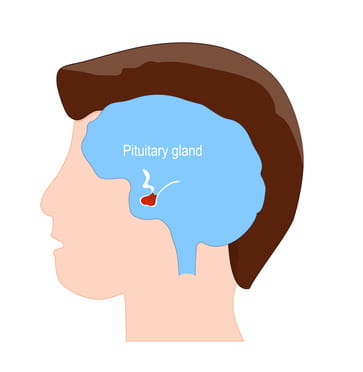What is Hypopituitarism and Panhypopituitarism?

The pituitary is a small gland located at the base of the brain. It is referred to as the “master gland” because it controls many hormones. The pituitary makes hormones that are needed for normal body functions.
When you do not have two or more of the pituitary hormones, it is known as hypopituitarism (hahy-poh-pi-too-i-tuh-riz-uh m).
The lack of all pituitary hormones is known as panhypopituitarism.
The hormones made by the pituitary gland include:
- Growth hormone (GH)
- Adrenocorticotropic or stress hormone (ACTH)
- Thyroid stimulating hormone (TSH)
- Gonadotropins or puberty hormones (LH / FSH)
- Antidiuretic or water hormone (ADH)
- Oxytocin
- Prolactin
Cause
Congenital hypopituitarism means the pituitary did not develop normally before birth. Acquired hypopituitarism refers to damage to the pituitary during or after birth.
Other causes of pituitary problems include radiation treatment for cancer, severe head trauma, infections, or surgical removal of the pituitary gland. Certain kinds of tumors may affect the pituitary.
Symptoms
Symptoms are different depending on which pituitary hormone is not made.
- Lack of growth hormone causes poor growth.
- Low ACTH may cause nausea or vomiting, cold, clammy skin, fast heart beat, dizziness, confusion, dehydration.
- Low TSH may cause tiredness, dry skin, constipation, weight gain, slow heart rate, slow growth.
- Low LH or FSH may cause short stature in both boys and girls. For boys, it also may cause small testicles and no facial hair. For girls, it also may cause little breast development and lack of a period.
- Low ADH causes excessive urination and bedwetting.
- No oxytocin or prolactin may cause poor milk production if breast feeding.
Treatment
Children may need to take replacement medication for the rest of their life because they are unable to make some or all of these hormones.
- Growth hormone is given by an injection.
- ACTH hormone is a tablet given by mouth two to three times a day throughout life. The dose is increased for stresses such as illness, fever, and injury. If the medicine cannot be taken by mouth, it is given by injection.
- Thyroid hormone is a tablet given by mouth once a day.
- Gonadotropin or puberty hormones are replaced with estrogen or testosterone at puberty. Girls are given estrogen and boys are given testosterone.
- ADH or water hormone can be given several different ways. The medicine used is desmopressin (DDAVP). The provider may adjust the amount of water your child drinks.
- Deficiencies in other hormones such as oxytocin and prolactin do not need to be treated.
When to Call the Doctor
Call your provider’s office with questions, concerns or for medication refills. You can reach the Endocrine Clinic at Cincinnati Children’s at 513-636-4744.



